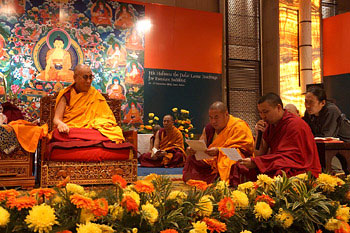New Delhi, India, 25 December 2012 – Although the weather outside in Delhi today was misty and cold, when His Holiness the Dalai Lama reached the large hall of the Kempinski Ambience Hotel, he was greeted by hundreds of smiling faces. He began his talk in a characteristic down to earth way:
“I have no blessings to give; I don’t think of myself as the Dalai Lama, but as another person like everyone else. The important thing is that we want to lead a happy life and to do that we need to educate ourselves.”
 He said that of the miracles the Buddha revealed through the actions of his body, speech and mind, it was through his speech that he taught the difference between the paths of right and wrong. He showed how to find happiness and overcome suffering. The suffering we don’t want and the happiness we do both arise from causes. Suffering comes about principally because of our ignorance. Although we seek happiness, because of ignorance we tend to create the causes of suffering. So, we need to know what brings us happiness and what gives rise to suffering. The Tibetan master Je Tsongkhapa said of the Buddha, “Of all your enlightened deeds, your speech is supreme; therefore the wise remember you for your teaching.”
He said that of the miracles the Buddha revealed through the actions of his body, speech and mind, it was through his speech that he taught the difference between the paths of right and wrong. He showed how to find happiness and overcome suffering. The suffering we don’t want and the happiness we do both arise from causes. Suffering comes about principally because of our ignorance. Although we seek happiness, because of ignorance we tend to create the causes of suffering. So, we need to know what brings us happiness and what gives rise to suffering. The Tibetan master Je Tsongkhapa said of the Buddha, “Of all your enlightened deeds, your speech is supreme; therefore the wise remember you for your teaching.”
His Holiness explained that we cause ourselves suffering by clinging to the appearance of things. What we need is to see how things really are. To do this we need to use our intelligence to the utmost. We need to study, learn and overcome the ignorance within us. Remarking that he won’t be able to teach the entire book on this occasion he said,
“You have the book, read it, make yourselves familiar with it, and go over it again and again until the pages become blackened with use.”
Shantideva, the author, did not write the book for mere entertainment. The contents concern what the Buddha taught and the later commentaries of subsequent teachers. He states that he composed it to acquaint them to his own mind. His Holiness said it takes intelligence to see what the book says and persistence to understand it. He again quoted Je Tsongkhapa: “Therefore the wise who have an intention to practise train their minds with intelligence.” What this implies is that we should reflect on the teaching, not just repeating it to ourselves, but questioning it, checking what the text says against our own experience and comparing what we discover with what others have to say. In the end this will bring us to the importance of cultivating a warm heart.
– Read more : dalailama.com
– His Holiness the Dalai Lama Teaches a Group from Russia in Delhi – Day One
– His Holiness the Dalai Lama Teaches a Group from Russia in Delhi – Day Three




